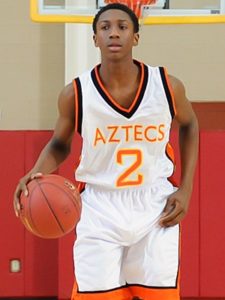Posts Tagged “ncaa division”
The NEW NCAA academic requirements by College Hunt
Posted by SportsForce in College, High School, Prep, Q & A, Recruiting, Tips & Advice, tags: academic requirements, athletic scholarship, Bethany College, college admission, college commitment, College Hunt, college recruiting, college selection process, core course, eligibility center, NCAA, ncaa division, NCAA division I, ncaa division II, ncaa division III, NCAA requirements, recruiting processOur partner Matt Hunt from College Hunt helps students successfully navigate the college selection process. In his latest blog post he explains the new NCAA academic requirements for Division 1, 2, and 3.


Planning on, or dreaming to one day participate in NCAA Athletics? Before you step onto the field or court you must first complete the required academics to be eligible for participation. Beginning in August 2016 the NCAA is increasing the minimum academic requirements student-athletes must meet to participate in Division 1 and 2 athletics. While these changes may seem minor, it’s important to remember all students planning on playing Division 1 or 2 athletics must meet these requirements or they will be academically ineligible.
Before we dive into the specific academic requirements we should first understand the purpose of the NCAA Eligibility Center. Think of them as the checks and balances for coaches as well as colleges/universities on whether or not the student has met the established requirements. Keep in mind, they are separate from admissions; a student still applies to individual schools during senior year. A common misconception from students is they believe if they’ve met the NCAA Eligibility requirements they are good to go, but in reality, they have only met the standard to play.
What is a Core Course? The NCAA Eligibility Center requires students earn a specific number of Core Courses by a certain point in high school as part of meeting eligibility. Now, there are some differences in the amount and timeline per level (D1, 2, & 3), but the definition of a Core Course remains the same. A Core Course is one that counts towards graduation in the core curriculum: English, Math, Natural or Physical Science, Social Science and World Language or Comparative Religion. Students must earn at least a D or higher in these courses. I know what you’re thinking, the NCAA allows D’s? Correct, but remember four-year colleges and universities do not.
The NCAA Eligibility Center has clearly defined specific academic requirements for Division 1, 2, and 3. Here is a breakdown of those requirements for each Division….
Division 1: minimum 2.3 GPA, increase on the SAT & ACT sliding scale, 10 of the 16 core courses must be met before the start of senior year.
Division 2: minimum 2.0 GPA, combined 820 on SAT or sum 68 on ACT, & 16 core courses completed.
Division 3: the college or university, not NCAA Eligibility Center, determines eligibility for admission, financial aid, practice and competition.
What happens if a student fails to meet the academic eligibility requirements? It will first depend on which division they’re being recruited by and how they’ve missed the requirement. The results may range from delayed opportunity to play, having to sit for an extended time or worse- being ruled academically ineligible.
Remember, the number one focus should be earning successful grades throughout high school to meet the requirements to play and more importantly too give yourself the opportunity to earn admissions into the college or university you’re desiring to attend.
For more information about the college selection process check out his blog!
Saben Lee: Over 20 NCAA Division I Offers…
Posted by SportsForce in Basketball, College, Commitments, Commitments, High School, Inspiring Stories, Planning, Recruiting, Tips & Advice, tags: college basketball, college commitment, college propsects, college recruiting, college recruiting game plan, highschool basketball, ncaa division, Saben Lee, sportsforce, target list

Congratulations to SportsForce client Saben Lee. Saben is a 2017 Point Guard from Phoenix, AZ. We began introducing Saben to college basketball coaches in his sophomore year of high school. Within about the first year of our working together, Saben received more than 20 Division I offers, including Stanford, Nebraska, Louisville, Utah, Pepperdine, Boise State and many others. His final commitment was made to Coach Bryce Drew at Vanderbilt University of the SEC.
Regardless of your sport, the 5 Critical Elements to Securing Multiple Offers include:
- Good Communication: top college recruits understand how to effectively communicate with college coaches by asking strategic questions that uncover a coaches’ true interest in them, while also being uniquely prepared for those questions college coaches will ask of them.
- Appropriate Target-Lists: top college recruits focus on proper target-list schools and sports programs that match their athletic and academic skill-set, instead of wasting valuable time and energy on collegiate opportunities that most likely will never be realized.
- Take Control: top college recruits avoid the trap of relying solely on external factors to generate offers, such as assistance from high school or club team coaches, and only attending viewing tournaments, or camps in order to be “seen” or evaluated by college coaches.
- Stay Disciplined: top college recruits prepare for, and are diligent in the use of appropriate follow-up strategies with college coaches, even when some opportunities appear to be going nowhere. They spend time researching best-fit schools and make it easy for coaches to communicate with them.
- Game Plan Execution: top college recruits learn the importance of creating and then executing a well-thought out plan to beat the competition, and the competition is fierce in order to achieve your college recruiting goals. They know the absence of a well-developed plan creates uncertainty, misdirection and lost recruiting opportunities.





